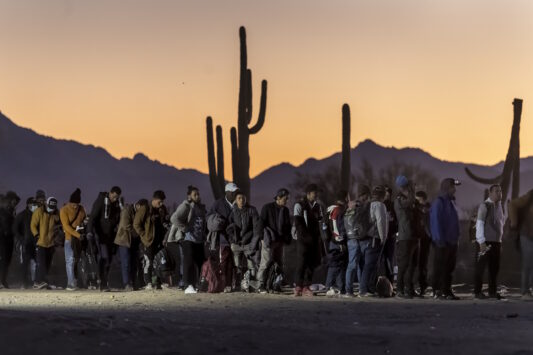Para leer en español, vea esta traducción de Google Translate.
With apprehensions at the southern border still near historical highs, some congressional Republicans have raised concerns about the number of border crossers who have been counted as so-called “Special Interest Aliens.”
Those are migrants the Department of Homeland Security defined in 2019 as non-Americans who “potentially” pose a “national security risk” to the United States based primarily on their travel or country of origin — not any specific actions.
But in multiple interviews in January, Republican Sen. James Lankford of Oklahoma called “tens of thousands” of such migrants a “national security risk” without using the “potential” qualifier.
In a Jan. 28 interview on CBS’ “Face the Nation,” Lankford said, “Just in the past four months, we’ve had tens of thousands of people that came across our border that were identified as a national security risk.”

Three weeks earlier, in a “Fox News Sunday” interview on Jan. 7, he mentioned SIAs specifically.
“We’ve had literally tens of thousands of people just in the past year that this administration has labeled as a national security risk. They were given the designation ‘Special Interest Aliens.’ That definition is there, a national security risk, and then they were released into the country into this decade-long backlog,” Lankford said.
We asked Lankford’s office for the source of his claims, but we have not received a response.
In September, the conservative Daily Caller News Foundation did report that between October 2022 and August 2023, border officials listed nearly 75,000 migrants who entered the U.S. illegally as “Special Interest Aliens.” That data, which is not publicly available, was obtained from U.S. Customs and Border Protection, the Daily Caller said.
But instead of saying all the migrants were found to be a security threat, the article said they were “flagged … for potentially posing risks to national security.” And the Daily Caller cited a 2019 Department of Homeland Security fact sheet that defined “Special Interest Alien” this way:
DHS fact sheet, Jan. 7, 2019: Generally, an SIA is a non-U.S. person who, based on an analysis of travel patterns, potentially poses a national security risk to the United States or its interests. Often such individuals or groups are employing travel patterns known or evaluated to possibly have a nexus to terrorism. DHS analysis includes an examination of travel patterns, points of origin, and/or travel segments that are tied to current assessments of national and international threat environments.
The fact sheet continued: “This does not mean that all SIAs are ‘terrorists,’ but rather that the travel and behavior of such individuals indicates a possible nexus to nefarious activity (including terrorism) and, at a minimum, provides indicators that necessitate heightened screening and further investigation. The term SIA does not indicate any specific derogatory information about the individual — and DHS has never indicated that the SIA designation means more than that.”
In the same document, the DHS noted that “Special Interest Aliens” should not be confused with known or suspected terrorists, which are different classifications.
A “known terrorist,” the DHS said, is someone who has been arrested for, charged with or convicted of terrorism, or it can be someone whom a government has identified as a terrorist or a participant in a terrorist organization. On the other hand, a suspected terrorist, according to the department, is someone “reasonably suspected” by officials of having engaged or planned to engage in terrorism.
In fact, the Daily Caller article observed that “migrants can be deemed special interest aliens based solely on their country of origin, such as Turkey or Uzbekistan, according to an internal Border Patrol document previously obtained by the DCNF.”
Immigration experts have made similar points about the limits of the special interest description.
“DHS has a fancy definition of SIA, but the reality is that the SIA designation is a label for illegal immigrants from a country that could have terrorists, and nothing more,” Alex Nowrasteh, vice president for economic and social policy studies at the Cato Institute, said in congressional testimony in September.
David Bier, Cato’s associate director for immigration studies, has pointed out that migrants of special interest could even include “a family fleeing terrorists, like the Syrian Christians who showed up at the border in 2015.”
Nowrasteh also told Congress that when researching back to 1975, he found no instances of a terrorist attack in America being carried out by someone who had illegally entered the U.S. via the southern border.
In that time, Nowrasteh said, nine of the 219 foreign-born terrorists he identified had entered the U.S. illegally; five came through the border with Canada, and one was a stowaway on a ship. The other three — Dritan Duka, Eljvir Duka and Shain Duka — were brought across the southern border illegally as very young children in the 1980s and later became radicalized in the U.S. In 2008, the three Duka brothers were convicted of plotting a foiled attack on New Jersey’s Fort Dix military base in 2007.
Although he said there is always a chance of an attack in the future, he advised lawmakers that “SIA is not a meaningful metric to understand the threat of terrorism along the border or anywhere else.”
Based on the 2019 DHS definition, migrants of special interest “potentially” pose a national security risk, which is less definitive than the threat level Lankford assigned to them in TV interviews last month.
Editor’s note: FactCheck.org does not accept advertising. We rely on grants and individual donations from people like you. Please consider a donation. Credit card donations may be made through our “Donate” page. If you prefer to give by check, send to: FactCheck.org, Annenberg Public Policy Center, P.O. Box 58100, Philadelphia, PA 19102.